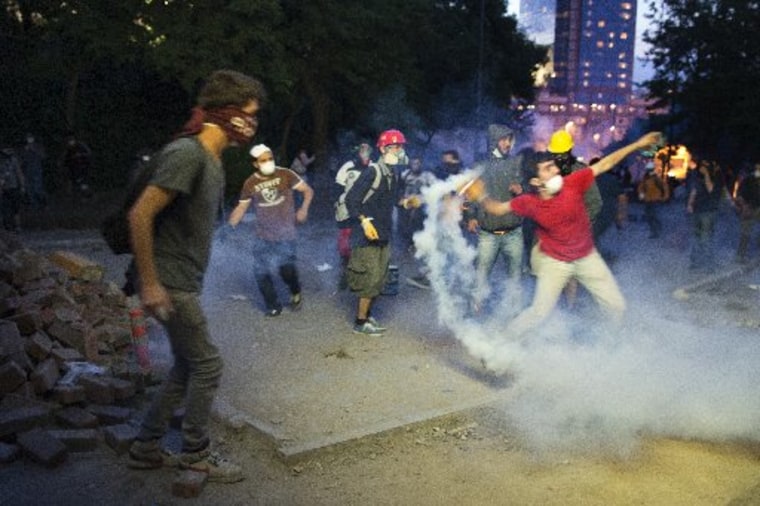Last Tuesday saw the beginning of protests in Istanbul, Turkey. Begun in the name of saving Gezi Park from being leveled and turned into a shopping mall, a peaceful demonstration gathered in protest of the bulldozing. But as Elif Batuman reported in The New Yorker, the movement quickly shifted from barbecues and concerts into "what feels like a war, with barricades, plastic bullets, and gas attacks." In Turkey, most media outlets have not reported on the violence, or the protests.
But what the Turkish media didn't say, Twitter and social media did. Photographs of police spraying tear gas at unarmed protesters and hosing down civilians to get them to move popped up on Twitter and the blogosphere under the hashtag #occupygezi. It was through this social media movement, and the power of this hashtag, that Murat Aktihanoglu, Oltac Unsal, and Duygu Atacan found the base for their crowdfunding movement to raise awareness about what was happening in Turkey.
They hoped to raise enough money to take out full page ads in either The New York Times or The Washington Post. "Our goal was to add more visibility and tell people what's going on in Turkey," Aktihanoglu told msnbc. "If you put an ad in the paper, it's going to draw some attention...to police attacking unarmed citizens. If the whole world is watching, maybe the [Erdogan] government will have to adjust."
The Indiegogo project reached its goal of $53,800 in less than 24 hours and has continued to raise more. As of 7pm EST on Monday, Indiegogo said it had raised more than $60,000.
Aktihanoglu, who runs an investment fund for early phase technology companies in New York, described the decision to help as "regular people that thought we could no longer do nothing." Anyone, he said, could have done what he and his colleagues have done. "We'd been watching what's going on in Turkey and Sunday afternoon I put something on Facebook and Oltac and Duygu commented and said 'yes, let's do something.' And we set up the Indiegogo website," he said.
The Indiegogo project, called "Full Page Ad for Turkish Democracy in Action: OccupyGezi for the World," is intended to ensure that the Turkish people can alert the world to the government's overreach: Aktihanoglu stressed that he has no partisan agenda. The founders wrote:
"The violent response to a peaceful protest to save Istanbul’s Gezi Park symbolizes an autocratic government’s increasing encroachment on the civil rights of the country’s citizens. We hope for new dialogue—one that can restore the trust of Turkish citizens in a government that positioned Turkey as a global economic power, but which is now getting recognition around the world for condoning harsh police retaliation that strikes at the pillars of democracy. This is not just about a park."
Aktihanoglu's original tweet was posted on June 2nd and was retweeted only 24 times--but tapped into the #occupygezi hashtag for support. He has since received thousands of emails of support for the project. The rate of donations and outburst of support was so startling that even Indiegogo CEO and founder, Slava Rubin, called Aktihanoglu to see what he had done to generate so much money in such a short period of time. "I just put it on Twitter, used the hashtag. It just grew," said Aktihanoglu. "Everybody felt they had to do something. I'm just amazed."
Please contribute to take a full-page ad on the Washington Post to explain #occupygezi to the world: igg.me/at/occupygezi/…— Murat Aktihanoglu (@muratny) June 2, 2013
The ad is expected to run in The New York Times "Wednesday, latest Thursday." Still, Aktihanoglu insists that he is not an activist. "We want the government to start listening to people and stop being so arrogant. We need to change what they're doing; it's not acceptable."
While he is calling for changes in how the government interacts with its citizens, he rejected any parallels between the Gezi protests and the next wave of the Arab Spring. "Turkey has a long tradition of being like a modern country; we just don't want to go back."
